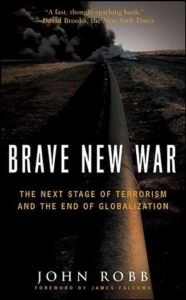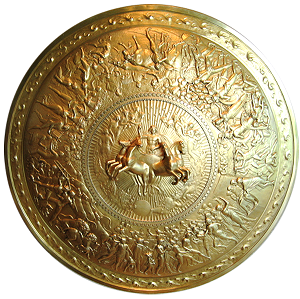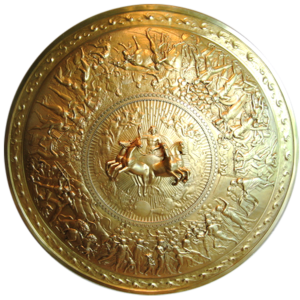In January I posted a series of “Strategy Reviews” where I examined the thinking of several authors who analyzed the state of politics and war at the beginning of this century. These were Thomas P. M. Barnett with the Pentagon’s New Map that divided the world between Core and Gap, Philip Bobbitt and the market state as defined in The Shield of Achilles, and John Robb with his Brave New War fought in a networked world. Each author’s viewpoint provided a way of understanding the tumultuous events of our time.
I would now like to reexamine these interpretations, but from another viewpoint – that provided by the generational theory of William Strauss and Neil Howe. This is a theory that I have been studying since I discovered it in the early 1990s, when I picked up the book 13th Gen: Abort, Retry, Ignore, Fail? at a book store. That book spoke to my personal experience, and I continued to explore generations by reading the other works of the authors. I won’t expound on the theory to a great degree in this post; you can read a review I wrote here, where you will find links to even more information.
The important thing to know about Strauss and Howe theory for the purposes of this posting is that they identified different social eras called turnings, which are characterized by particular social priorities and proclivities. In the United States of America, we are currently in a Crisis era which began with the financial crash of 2008. Previously, we were in an Unraveling era, which began during the Reagan years.
The Crisis Era
In an Unraveling, society is inward-driven, focused on the individual and loosely regulated. This changes in the Crisis, as a sense of urgency grows over problems which were allowed to remain unresolved in the previous era. Society becomes focused on the community, and more restrictive in what it allows of the individual.
Since the strategists mentioned above are primarily concerned with security and with international relations, we should examine what the implications of the Crisis are in these realms. The main consideration is that, in a Crisis era, society seeks to close itself off and insulate itself from perceived threats. This is apparent, for example, in the crackdown on illegal immigration which began during the Obama administration and continues bitterly into the Trump administration.
Another way in which the United States is closing off is by withdrawing from the rest of the world, changing its posture with respect to international security relations. This began with Obama’s pullback from the wars started by the previous administration, and continues with the more drastic policies of Trump, who has pulled out of international agreements and adopted an overtly nationalist stance for his administration. “America First” couldn’t be a more fitting slogan for a Crisis era.
Trumpism repudiates the idea of the United States as a responsible global hegemon promoting democracy and free-market capitalism – the role the country took on in the aftermath of the Cold War, albeit a role which proved costly, unpopular – and perhaps hopeless. Trumpism also repudiates economic globalization, which came at the price of high-paying working class jobs in the United States. These Unraveling era policies could be labeled the “neo-liberal regime,” which in the Crisis era has become delegitimized. In fact, John Robb specifically describes the Trump victory as rolling back neo-liberalism.
Thomas Barnett acknowledges this fact about Trump’s appeal in his own election post-mortem post. Barnett’s vision of the United States securing peace by maintaining military overwatch while helping to connect the world into a global economy of functioning, developed states, is not suited for the Crisis era social mood. Americans see the problems that grew in the era of globalization, particularly the erosion of the middle class, as no longer endurable. It is telling that both the Trump and Sanders campaigns in 2016 called for reversing trade policies that are perceived to have driven down wages in the United States.
In his work, Thomas Barnett cautioned against the urge to “firewall the Core against the Gap,” instead promoting the idea of greater connectivity among nations. But that was an idea better suited for the Unraveling era. In the Crisis era the desire is to “circle the wagons” and protect what remains of the social order from further collapse. To the political left this means addressing wealth inequality through government largesse (which the right calls socialism). To the political right this means restricting travel and immigration, even to the point of building a wall on the southern border (which the left calls racism). For neither side, however, is the status quo acceptable.
The New Form of the State
So what of the fate of Philip Bobbitt’s market state? According to Bobbitt, it is a form of the state that derives legitimacy from maximizing opportunity for its citizens, not from advancing their welfare. But in turnings theory, maximal opportunity for the individual is a priority of the Unraveling era. In the Crisis era, community takes precedence, hence the return of nationalist rhetoric into politics. So is the nation state, which the market state was supposed to supplant, making a comeback?
John Robb isn’t the only way who sees the market state being rolled backed; in another post, a pseudonymous author argues that the failure of the market state paradigm comes from the agency problem: market state elites have not been looking out for the best interests of the citizens they ostensibly serve. This is indeed a primary criticism of the old neo-liberal regime, particularly from the extreme political right, who would go so far as to call internationalists traitors.
The irony of Trump’s electoral victory, of course, is that his opponent, Hillary Clinton, was arguably a champion of neo-liberalism, and yet she still received more popular votes than Trump in the election. She was, in fact, the second most popular U.S. Presidential candidate in history, after Barack Obama. The accusations that there was meddling in the election, in Trump’s favor, by hackers sponsored by the Russian government, segues into another area covered by our strategists – network warfare.
The problem with dispensing with Bobbitt’s theory of the market state is that, while he missed the fact that social priorities would alter because of generational change, he is probably correct in identifying a new strategic landscape. Assuming that nuclear weapons really have rendered conventional war between Great Powers obsolete (the M.A.D. doctrine), warfare has shifted to the level of network exploitation. The new threat environment is rife with computer hackers and social media trolls. This is no joke – these bad actors can sway public opinion, influencing election outcomes and paralyzing governments, and can radicalize young people in far-away countries, prompting them to commit mass murder. They can even penetrate the computer networks responsible for operating vital infrastructure.
So the state will still need to adapt its strategy for protecting its citizens, in order to maintain legitimacy. The question of what form it will ultimately take remains open. It is particularly unclear in the United States, since the country is so deeply split along partisan lines. Will Trumpism become entrenched, or will the political tide turn against it, as Trump-resisters hope? Either way, turnings theory predicts that the institutions of government will transform. If the “nation state” returns, it won’t have the same form as the nation state of the World War era.
With the United States having abandoned global leadership, there is now more open competition among the Great Powers for determining the best internal order for surviving in the new international strategic environment. Momentum likely favors what Barnett called the “New Core” – the nations which more recently joined the developed world. All bets seem to be on China as the new world leader – though this thinking could reflect the West’s anxiety more than reality.
The old liberal, international regime which attempted to thwart and contain authoritarianism in the previous era has been hamstrung, and authoritarianism is on the rise, even in formerly liberal nations. The international order will continue to break down, as individual nations become more focused on their own affairs. The Crisis era is characterized by a lack of trust, and it is the misfortune of the United States that this includes a lack of trust across the partisan divide.
A new mode of competition over cooperation clearly presents dangers. There is no ironbound guarantee that the late twentieth century paradigm that rendered WMDs for deterrence use only will prevail. There is no sublime, unbreakable bond keeping the United States united. But whatever events lie ahead, it is likely the Crisis era will last at least another decade, and that the world will look much different when we emerge from it. We are on a journey through one of history’s great turning points.


 In my most recent posts I looked at the strategic theories of two different authors. The
In my most recent posts I looked at the strategic theories of two different authors. The  My last post looked at the strategic theory of Philip Bobbitt, and his idea that we are in an era of transition from the nation state to the market state. Here is how I think he would explain the recent political upheavals.
My last post looked at the strategic theory of Philip Bobbitt, and his idea that we are in an era of transition from the nation state to the market state. Here is how I think he would explain the recent political upheavals. Although the books were published around the same time, it wasn’t until some time after reading
Although the books were published around the same time, it wasn’t until some time after reading